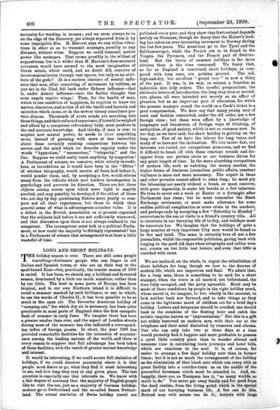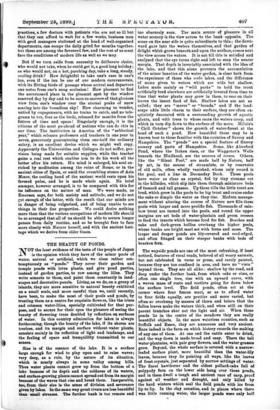LONG AND SHORT HOLIDAYS.
THE holiday season is over. There are still some people travelling—fortunate people who can linger in old Italian and Spanish towns, or who are on their way to the spell-bound East—but, practically, the tourist season of 1S99 is ended. It has been, we should say, a brilliant and favoured season, dominated by a little too much sunshine, rather than by too little. The heat in some parts of Europe has been tropical, and in our own Northern island it is difficult to recall a summer marked by such brilliance, or one in which, to use the words of Charles II., it has been possible to be so much in the open air. The favourite American holiday of "camping out," for which dry air is necessary, has been quite practicable in most parts of England since the first energetic flash of summer in early Jane. We imagine there has been a greater exodus than ever, and the aspect of London streets during most of the summer has also indicated a correspond- ing influx of foreign guests. In short, the year 1899 has provided remarkable facilities for the extension of acquaint- ance among the leading nations of the world, and there is every reason to suppose that full advantage has been taken of these facilities, with the result of greater mutual knowledge and interest.
It would be interesting, if we could secure full statistics of holidays, if we conld discover accurately where it is that people most desire to go, what they find it most interesting to see, and how long they stay at any given place. The last question is especially one that interests us. We know with a fair degree of accuracy that the majority of English people like to visit the sea, just as a majority of German holiday- makers go to Switzerland and the so-called Saxon Switzer- land. The actual statistics of Swiss holiday travel are published every year, and they show that Switzerland depends mainly on Germans, though we fancy that the Kaiser's lead- ing has taken an ever-increasing increment to Norway during the last few years. The Austrians go to the Tyrol and the Salzkammergut, while the French are to be found in the Vosges, the Pyrenees, and the French part of Switzer- land. But the locale of summer holidays is far more obvious than is the time consumed. We fancy that, so far as England is concerned, short bolid.ays, as com-
pared with long ones, are gaining ground. The old, high-and-dry, but excellent " grand tour " is now a thing of the past. It was, in its way, as solemn a function as induction into holy orders. The careful preparations, the elaborate letters of introduction, the long stay even at second- rate places, all were intended not merely as an affair of pleasure, but as an important part of education, for which the present scamper round the world on a Cook's ticket is a poor compensation. We dare say that many young men of rank and fashion contracted, under the old order, not a few foreign vices ; but these were offset by a knowledge of languages and literatures, of foreign ways of thinking, of antiquities, of good society, which is not so common now. In our day, as we have said, the short holiday is gaining on the long one. Few of us have the leisure for long tours, and many of us have not the inclination. We live rather fast, our interests are varied, our occupations numerous, and we find it difficult to break off with these constant rounds and dis- appear from our private circle or our business duties for any great length of time. In the more absorbing occupations of modern life, such as watching the money market, the higher forms of business, journalism, public affairs, constant vigilance is more and more necessary. The expert in these and other pursuits cannot affiard to relax long; he must ply the labouring oar nearly without a break, or must contrive, with great ingenuity, to make his breaks at a few intervals. He tries to screw out a week at Easter or a fortnight after Parliament has risen ; but he must remember the Stock Exchange settlement, or must make allowance for some sudden political complication or some crisis in the markets, and perhaps ends by accepting a few " Saturday to Monday " excursions to the sea or visits to a friend's country villa. All is uncertain in our hurrying life of to-day, and holidays must be uncertain too. We imagine that the holidays of quite a large number of very important City men would be found to be few and brief. The same is certainly true of not a few journalists, whilst the responsible politician, gazing back with longing to the good old days when telegraphs and cables were not, counts on but little real leisure, and even that little is crowded with cares.
We are inclined, on the whole, to regret the substitution of short holidays for long, though we bow to the decrees of modern life, which are imperious and final. We admit that, for a busy man, there is something to be said for a short scamper, when the route is all marked out beforehand, the time fully occupied, and the party agreeable. Much may be made of these conditions by people in the right holiday mood, whose secret is, we imagine, to live wholly in the moment, to look neither back nor forward, and to take things as they come in the lightsome mood of children out for a brief day's holiday. Letters and telegrams should be avoided, one should bask in the sunshine of the fleeting hour and catch the artistic impulse known as " impressionism." But this is a gift not widely bestowed on modern men, with their ear at the telephone and their mind disturbed by rumours and alarms. One who can only take two or three days at a time would probably find it happier and more profitable to possess a quiet little country place than to wander abroad and consume time in calculating train journeys and hotel bills, which are vexations to the soul. It is, of course, far easier to arrange a few days' holiday now than in former times; but it is not so much the arrangement of the holiday as the elimination of that black care which can creep with as great facility into a corridor-train as on the saddle of the proverbial horseman which must be attended to. And, un- happily, there are, as Tennyson has it, " so many worlds, so much to do." You never get away finally and for good from the dead routine, from the living grind which is the special mark of our hurrying business life. A few can do this. Retired men with means can do it ; lawyers with large
practices, a few doctors with patients who are not so ill but that they can afford to wait for a few weeks, business men with good managers stationed at the head of well-organised departments, can escape the daily grind for months together, but these are among the favoured few, and the rest of us must face the conditions of modern life as well as we may.
But if we turn aside from necessity to deliberate choke, who would not take, when be could get it, a good long holiday; as who would not, on a hot, parching day, take a long, steady, cooling drink ? How delightful to take one's ease in one's inn, even if the inn be one of our modern caravanserais, with its flitting birds of passage whose arrival and departure one notes from one's snug seclusion! How pleasant to find the accustomed place in the pleasant spot by the window reserved day by day and to be sure to-morrow of that glorious view from one's window over the eternal peaks of snow soaring into the boundless sky ! How charming to wander, untied by engagements, with no trains to catch, and no tele- grams to vex, free as the birds, released for months from the fetters of time and space ! Singularly enough, it is the citizens of the most go-ahead of nations who can do this in our time. The institution in America of the "sabbatical year," which releases professors and teachers in one year in seven, generously guaranteeing them one-half the ordinary salary, is an excellent device which we might well copy. Apparently the Universities and Colleges do not suffer, pro- vision being made for suitable supplies, while the teacher gains a real rest which enables him to do his work all the better after his return. His mind is enlarged, his soul en- riched by meditation among the ruins of Rome, or in the ancient cities of Spain, or amid the crumbling stones of Asia Minor, the cooling band of the ancient world rests upon his fevered pulse, and he is made whole again. No brief scamper, however arranged, is to be compared with this for its influence on the nature of man. We were made, as Emerson says, for both society and solitude, and we do not get enough of the latter, with the result that our minds are in danger of being vulgarised, and of being unable to see things in their due proportion. We could desire nothing more than that the various occupations of modern life should be so arranged that all of us should be able to secure longer pauses from daily routine, and so be brought face to face more closely with Nature herself, and with the ancient heri- tage which we derive from older times.



































 Previous page
Previous page